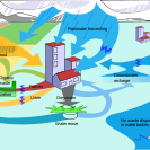
ECOSAN plan: getting dual benefits of recycling nutrients and water conservation by ECOSAN Team of Nepal
 Abhik Tayal Jun 14, 2014 01:23 |
Hi Thakur Pandit,
You have a very interesting concept. This can be a major breakthrough and a stepping ladder to something of great value.
However, we would like you to complete your proposal. In the interest of time with only 36 day left, please do not miss out on this wonderful opportunity to present your plan to our esteemed audience.
If you need help, please reach out to me or other catalysts/fellows for helping you out.
Regards
Abhik Tayal
MIT Climate Co-Lab catalyst
|
 Thakur Pandit Jun 28, 2014 02:22 | Proposal contributor
Dear Abhik,
Thank you very much for encouragement.
I was in the field works so I couldn't fill in the proposal.
Now I am continuing the work. If I need help in some aspect, I will request you for the same.
May be I will try to inform you for support when I complete drafting the full proposal.
With best regards,
Thakur
Kathmandu
Nepal
|
 Ujala Qadir Jul 1, 2014 03:10 |
Dear Thakur,
As a Climate Co-lab Fellow for the Waste Management Contest, I would like to thank you for your participation and submission. You have an interesting concept, particularly with regard to your scaling up model, using demonstration and resource centers. This is the kind of innovation needed for long-term sustainability.
It would be great if you could flesh out some of the details of your proposal. After a quick review, I have a few questions and comments that you may consider looking at while finalizing your proposal.
1. It is unclear what the actual product or approach is. What is Ecosan? It is not clearly explained. Is it waste a collection methodology? Does it include infrastructure? Is it a technology? Please include these details.
2. How are carbon emissions reduced through this project? In the section of the proposal related to this, I see you have mentioned that carbon emissions are saved through the lack of production and transport of chemical fertilizers? However, as you may know - methane is produced from composting. Have you done any calculations of the various emission savings and new emissions from this technology/approach?
3. With regard to sustainability and scaling up, it would be interesting to know what the costs of the Ecosan system/model is. How do you expect private sector to play a role? Is there a profitable business model that can be developed with the Ecosan approach? Is there demand for the product, and if so - by who? Who would be the target market?
I hope that these questions are of use and may provide some guidance on proposal development. Good luck!
Best Regards,
Ujala
|
 Sergio Pena Jul 1, 2014 04:40 |
Hi,
the concept is excellent. The main question is how to implement the proposal in developing countries in which they do not have enough money to pay for the service. Might be possible to combine the sanitation with the production of electricity, for example.
I am thinking in other places like Latin America in which countries in a different stage of development or in a different pattern of development do need energy and this project might contribute to clean energy systems in small scale
|
 Agharese Lucia Ojelede Jul 1, 2014 05:12 |
Hello Thakur,
A very good initiative you have here but you did not mention the amount in volume of the resources that you expect to collect in the different district, the means of collection and the collection point.
Kindly consider these points when you are providing additional information.
Regards,
Arese
|
 Thakur Pandit Jul 2, 2014 09:31 | Proposal contributor
Dear All,
Thank you very much for the constructive comments, suggestions and support for this proposal.
We are still improving the proposal by trying to incorporate your queries and suggestions. We are also building our team at level with interested and competent experts from the fields of water, sanitation, agriculture, sociology etc. Similarly, we do invite interested experts to become members who have some experience of ECOSAN promotion at grass root level in close coordination with local government sanitation programs in other developing countries.
In fact, the ECOSAN Plan is a practical approach to promote the ECOSAN technology with active participation of local farmers, governments and other concerned stakeholders. We want to start from a small scale and simple activity and grow gradually up to national level by mainstreaming the lessons and involving stakeholders. We have not yet estimated the carbon emission scenarios before and after implementation of this proposal. Probably we need to consider a variety of complex factors in this context. We still consider the ECOSAN Plan as a No-Regret Option to reduce the carbon emission through reduced use of the chemical fertilizers by the farmers and subsequent positive environmental impacts. However, we think to incorporate the calculations in stage of detail proposal preparation if not at this initial stage.
We do welcome your thoughts, comments and queries further to improve the proposal and supporting it to win so that we can implement it in Nepal. The ECOSAN Team in Nepal will be happy to learn from you all and get your support !
|
 Kamal Adhikari Jul 19, 2014 05:25 | Proposal contributor
Dear Mr. Thakur,
It would be great if you could incorporate issues related to laboratory research in connection with this proposal.
Regards,
Kamal
|
 Thakur Pandit Jul 19, 2014 06:34 | Proposal contributor
Dear Mr. Kamal,
Thank you for the comment which is important for improvement of our proposal. There are several laboratory research related documents published online. I would share some of them for our readers and reviewers.
1.A Success Story in Uganda: http://www.wsscc.org/sites/default/files/publications/ecosan_node_case_study_booklet_final.pdf
2. A new paradigm to conventional waste water solutions: http://www.sensociety.org/?q=ecosanitation
3.Safe use of water and nutrients from ecological sanitation systems in agriculture: https://www.uni-hohenheim.de/respta/hygenv.php
Various academic and research organizations have already contributed with their in-depth study reports in favor of ECOSAN. Though it is a proven technology in the developed and various developing countries, the monitoring and field based use and efficiency of the nutrients from ECOSAN product will be always an important aspect for dissemination and local acceptance of its benefits. Therefore, we will consider this aspect in the detail design phase of the project.
|
 Thakur Pandit Jul 19, 2014 08:18 | Proposal contributor
Dear All,
I would like to invite members to comment on this important proposal which has a real plan to transform rural Nepal by providing a great opportunity to see, learn and practice ECOSAN benefits at an individual and household level. It will help to protect our rural environment from pollution and public health problems faced due to hap hazard disposal of household effluents. The project will become a landmark event in the history of Nepal's sanitation movement. The project will be developed into the ECOSAN movement and will eventually trigger our policy makers and development agencies to come up with their own action plans at every district. Let's support the ECOSAN Plan to get funded and make it a national campaign with momentum to boost this country's ongoing sanitation development plan. We can make the History! The ECOSAN Team of Nepal will contribute with its best efforts to make this happen! Best regards, Thakur (adaptnepal).
|
 Keshav Adhikari Jul 19, 2014 11:37 | Proposal contributor
At this stage of project development, the proposal seeks intellectual comments for its quality improvements so that the project outcomes could provide more realistic basis for policy dialogue for the application of ECOSAN concepts in the rural context of Nepal.
The proposal appears sound and promising. However, my own views on the project as it appears now, is that it should also consider to present, a bit more specifics or provide clarification of the technical (science part) aspects used to achieve the goal. For example, the methods,materials and infrastructures that will be used to recycle or reduce organic waste in the synthesis of value added products including the indicators of achieving a clean and healthy environment. Also, it would be better to link scientific,social and economical benefits to outcomes at each scale of project implementation.
|
 Han Heijnen Jul 20, 2014 01:51 |
A nice proposal. Certainly worthwhile to promote conservation of resources and reuse in agriculture. In Chitwan, ecosan has already been trialled, so further extension into this agricultural district is useful. District agricultural office is also supportive. As Chitwan is central and many people pass there on their way to Kathmandu, it is a good location for further demonstration and promotion.
1. As Chitwan district is already declared an Open Defecation Free (ODF) district, it would be good to position Ecosan as a post-ODF strategy. Alternatively other nearby districts (Bara, Parsa) where sanitation coverage is still limited could be used as demonstration site.
2. Though the proposal deals with resource recovery in waste management and reduction of emissions, the background for the project should be reflected somewhere. Ecosan is an attractive option for introducing safe sanitation in communities, as it combines health protection with economic benefits for the producer/user. In my opinion it is imperative to mention in the project that household sanitation promotion is the primary reason for Government and NGOs but that sustainability and 'green' approaches to human waste management are critical and can be incorporated in the Nepal context, provided demonstration, promotion and technical assistance is available.
|
 Kashi Thakur Jul 20, 2014 04:08 |
Dear Mr. Thakur
Nepal is promoting EcoSan since long. This technology would have been much ahead hare if it had been included as a part of sanitation campaign going on in the country to achieve 2017 National target of ODF declaration. I appreciate your present effort. Good Luck !
|
 Sudan Panthi Jul 20, 2014 04:08 |
Dear Thakur,
The idea you have developed is great to promote ECOSAN in Nepal. I found an article on ECOSAN in Nepal ( http://www.myrepublica.com/portal/index.php?action=news_details&news_id=79121) and may be interesting for you too. I suggest you to contact Mr. Shreendra Pokhreal and include him as a contributor. All the best !!!
|
 Osero Shadrack Tengeya Jul 20, 2014 06:22 |
Guys, you have a nice initiative,and seems doable. However, i suggest you to add how this project leads to greenhouse gas emissions. Have tried to go through your proposal, and am wondering whether it does mitigate emissions.Regards.
Tengeya.
|
 Umanath Sharma Jul 20, 2014 08:41 |
Hi all,
This is a very nice initiative towards environmental sanitation and waste management. On one hand collection and proper utilization of the wastes contribute a healthy environment and on the other hand, the waste will be directly converted to money as it can replace the application of other fertilizer as well as by increased productivity. Nepalese people will be greatly benefited this work.
Good Luck!
|
 Sabitri Kumari Tripathi Jul 20, 2014 12:10 | Proposal contributor
Thank you all for your constructive comments and suggestions to further shape our proposal. We are thankful for supporting this proposal!!!
My aspiration in this proposal is as follows:
It has been proved that wastes can be converted into resources with the application of appropriate technology. The Ecological Sanitation is one of the technologies which recognize human wastes as a resource. With the reintegration of sanitation with agriculture in a safe and sustainable way, access to high quality fertilizer is increased, reduction of the waste of water and hence rate of recharging of ground water increases which results the improvement of the economic status of low income farmer.
This technology is favorable for the reduction of greenhouse gas emission through diversion of urine as one of the ways to reduce the emissions.
In the country and many success stories throughout the globe indicates the great success of the ECOSAN technology. So the adaptation of the technology is one of the suitable and required options in the country. In case of Nepal, majority of the population (80%) resides in villages with different race, caste, culture, economic status and religion. So in spite of its great success, still there is acceptance problem existed among the communities. Innovative and fully acceptable ecological sanitation system is therefore needed. This requires further research in this sector. Also it is equally important to develop strategies and tools on how to disseminate knowledge among farming communities and stakeholders.
Similarly, integration of ECOSAN concepts in the capacity building and training activities in the field of watershed management and agriculture extension is also required. Therefore, our team is developing this proposal. As a team member I am committed to improve the proposal by linking with national and international research findings during preparation of detail proposal stage. I will try with my best effort to link the research activity involved in this project with the academia during preparation and implementation of this project.
|
 Keshav Adhikari Jul 20, 2014 12:43 | Proposal contributor
As a member of the current ECOSAN initiative, I would like to respond to the concern raised by Tengeya.
|
 Keshav Adhikari Jul 20, 2014 01:19 | Proposal contributor
As a member of the current ECOSAN initiative, I would like to respond to the concern raised by Tengeya. Primarily, I doubt we have adequate data at household level emission so far in the earlier ECOSAN efforts in Nepal (if any). So, primarily, this study is an opportunity to document, analyze and derive input-output balances of gaseous emissions such as carbon, methane and nitrous oxide from activities aimed at achieving self-sustained and clean environment in rural Nepal. Secondly, the reuse, recycle and reducing efforts of organic household wastes (urine, feces, along with other residues) would encourage the local production of food and fibers (helping for cultivating habit of relying more on fresh food) thus reducing the carbon foot printing resulting from changed peoples' habit of buying food items carried from miles away. Outcomes of this initiative will be seen more distinctly on regional level analysis.
|
 Thakur Pandit Jul 20, 2014 01:16 | Proposal contributor
Dear all,
First of all, I would like to express my sincere thanks to those who have shown great interest in this topic which has created a wave of concerns and discussions that will eventually support to improve the proposal at its detail preparation stage. We are also thankful to Mr. Tengeya who has raised the concern on how the ECOSAN contributes to reduce the GHG. In this regard, Dr. Keshav's response as the team member is very supportive and clear. In addition to his comment, I would like to add the following:
In the past, we had also reviewed several papers, reports and articles published at the local and international level. We found that the ECOSAN is already proven technology for utilization of the nutrient rich resources to close the loop agriculture – human - agriculture.
So far the reduction in emission of GHG from ECOSAN is concerned, there are several studies already conducted in the developed country contexts including in China. Below are some examples of the reports and links thereto for reference purpose:
1. Anaerobic waste decomposition and methane emissions: the paper indicates that the pit latrines produce methane gas in the anaerobic condition of sewage and sludge. There is also some calculation with estimations for regional level. The link to the paper is: http://pubs.acs.org/doi/abs/10.1021/es501549h
The paper has clearly mentioned about competitive advantage of composting options (in the ECOSAN technology) over the pit latrines which apply conventional anaerobic sludge digestion process.
2. ECOSAN combats climate change: this is an ongoing research held in Haiti and its outcomes will be very important for the ECOSAN interested professionals. The research expects to reveal facts and figures how much there is reduction of GHG (methane) in the conventional (anaerobic sludge model) versus composting options (ECOSAN). The link to the publication is: http://www.oursoil.org/ecosan-combats-climate-change/
3. Ecological-economic assessment of ecological sanitation development in the cities of Chinese Loess Plateau: This is a comparative empirical research conducted in China with clearly observed results in favor of ECOSAN technology to reduce the GHG emissions. The link to the research report is: http://www.sciencedirect.com/science/article/pii/S1476945X09000919
4. Sustainability and Climate Change aspects of Ecosan Toilet in the Nepal’s context: The paper has introduced some information on Nepal’s context in the development of ECOSAN. In addition to that the author (Mr. N.R. Khatri) has shown calculations on how much carbon emission can be reduced by using urine and composted fecal solids. According to the author, altogether 107 kg of carbon emission (supposed to be GHG in terms of equivalent carbon emission) per person per tear can be avoided by applying the ECOSAN technology. The link to the paper is: http://www.huussi.net/wp-content/uploads/2013/07/Nam_Raj_Khatri.pdf
Considering the conclusions from the above cited documents and findings, the project will also aim to conduct a comprehensive review of the literature on ECOSAN, its benefits in terms of reducing GHG emissions to combat the climate change. There is also needed to involve the research community in the piloting phase with demonstration sites as proposed in the villages of Chitwan district. These considerations will be incorporated in the detail proposal stage.
Best Regards, Thakur
|
 Krishna Kaphle Jul 20, 2014 03:02 |
Nepal is a crucial water body and source of this crucial component of life for the increasing billions in the sub-continent. One nation severely affected by climate change, with melting Himalayan glaciers at faster pace may seem positive with increased water levels but the exhaustion is inevitable. Though being a culture that worship water, we tend to destroy the pristine and put resources, focus and media attention to receiver-Bagmati restoration is an ideal example here. How we use water and manage the natural flow have huge impact to our Southern neighbors-India and Bangladesh. Hence, we have to be extra cautious and the urbanization, industrialized farming and poor waste disposal dare all contributing factors. urban sewers have to be managed, pharmaceuticals and other waste can be avoided by proper education, minimizing water consumption is a necessary step and above all recycling nutrients and water from waste will be a huge tool to begin with, and I am confident that this proposal by Nepalese scientist will be successful.
|
 Mahadeb Poudel Jul 20, 2014 10:41 | Proposal contributor
Dear all,
Thank you for your valuable comments and suggestion regarding the project concept on 'ECOSAN plan: getting dual benefits of recycling nutrients and water conservation'. In general the issues raise are whether the ECOSAN helps to limit green house gas emission.
A number of studies reveal that it can limit green house gas emission. The ECOSAN approach has been implemented in many parts of the world. A numbers of studies have been carried out regarding the contribution of ECOSAN to prevent greenhouse gas emission and economic benefits. Khatri (2013) presented that ECOSAN toilets contribute to supply of Nitrogen, Phosphorus, and potassium to soil, which indirectly contributes to avoid 107 kg carbon emission /person/year. Jhou et al. (2009) examined three sanitation models including ECOSAN. They revealed that ECOSAN is relatively higher avoider of greenhouse gas emission, lesser water polluter, lesser health risk contributor and also relatively cheaper in installation. Moreover, Reid et al. (2014) showed that an alternative to Pit Latrine, which is similar to ECOSAN concept, reduces the emission of Methane gas sufficiently and also ensures the hygienic sanitation. Thus, this approach is good for limiting green house gas emission and good for pollution control.
However, studies showed varied results in different locations. Thus, the project will be more science based as well as more convincing if it can incorporate two study components. For example, (1) study on effect of human urine and decomposed fecal matter on agriculture productivity focusing to Chitwan district of Nepal and (2) study on limiting effect of ECOSAN on green house gas emission.
Thank you
Kind regards
|
 Dinesh Manandhar Jul 20, 2014 11:22 |
Very interesting initiative indeed starting form grass root to national level. Ecosan (specifically use of urine diverting toilets) which started in 2002 in Nepal has already gained much popularity at grass root level need to be scaled up and owned by the stakeholders. Nepal being agriculture based country has even more opportunity of promoting organic fertilizer and at the same time contribute towards 2017 goal of universal coverage in sanitation. Also water conservation with basic principle of "Don't Mix" should be promoted. More over multidisciplinary research and actions between sanitation and agriculture professionals and line agencies is a must to scale up ECOSAN. I am ready to support the cause if needed. All the best wishes.
Regards
Dinesh
|
 Babu Ram Khanal Jul 21, 2014 12:22 |
The project will be milestone to solve the real problems of people. The key features of this project are the conversion of unused solid wastes into the valuable organic manure, water conservation, sanitation and at the same time reduction of GHG from the soil. Thus, the findings of this project will be guideline for the management of waste resources through multidisciplinary approach.
Regards,
Babu Ram Khanal
|
 Andrew Shaw Jul 21, 2014 09:18 |
I don't feel qualified to comment on the ECOSAN approach but I support your vision and effort. I'm more involved with centralized treatment systems in western nations, but I did recently collaborate on a paper submitted to the upcoming International Water Association Conference in Kathmandu this October that touches on nutrient recovery throughout the globe. It should be an interesting conference: http://iwa2014nepal.org/
|
 Kamal Adhikari Jul 22, 2014 04:23 | Proposal contributor
Dear All,
As an employee of the Department of Water Supply and Sewerage (DWSS), I am directly involved in implementing the Sanitation and Hygiene master Plan 2011, formulating strategic plan at national and sub-national levels, conducting capacity development activities for both policy and program level stakeholders and scaling up innovative sectoral learning. Hence, I will facilitate to link up ECOSAN initiatives with the planning frameworks of the ongoing total sanitation initiatives in the country taking in to account the post-ODF activities, Environment Friendly Local Governance Framework and the Clean City Program of the Government of Nepal.
In the existing policies and strategies of DWSS, ECOSAN technology is well accepted and considered appropriate for promotion in rural and semi-urban areas in Nepal. The technology should be promoted at household level based on exiting learning from districts. The proposed ECOSAN plan has reflected the institutional capacity gaps in the existing program of the sector stakeholders. In addition, it will help maintain sustainability by integrating sanitation with livelihood at very grass root levels directly benefiting the farmers.
The ECOSAN technology thus proposed has benefits the users in manifold ways: a) it helps minimize the consumption of water which is being declined due to climate change, b) it helps reduce emission of Methane gas thus contributing to mitigate the climate change. c) use of urine and composted faeces will be utilized in farms yielding quality organic products and reducing investment for chemical fertilizer.
As a team member of the ECOSAN initiative, I am committed to support for project design and implementation in coordination with DWSS, concerned Government agencies, WASH Coordination Committees, researchers and all well wishers of ECOSAN.
Thank you very much for your good faith and support.
Kamal Adhikari
Sociologist
Department of Water Supply and Sewerage, Government of Nepal
|
 Uma Shanker Joshi Jul 22, 2014 04:52 |
Dear All,
I wish all the best for the success of the proposed plan for ECOSAN promotion in Nepal.
The success of the plan will depend on close coordination with the government and WASH Coordination Committees in all levels.
Regards,
Uma Shanker Joshi
Chief, Environmental Sanitation Section of the Department of Water Supply and Sewerage
Government of Nepal
|
 Busi Skosana Jul 29, 2014 07:20 |
Hi Team
I know that this is going to be a successful undertaking.
Having lived in the rural area here in South Africa, I experienced first-hand the benefits of the human waste. The pit latrines people used, were normally given two years after being covered when full, then the soil around the area would be harvested and used as manure for the fields.
The Ecosan Nepal will surely benefit the primary stakeholders (farming community). The economic benefits derived from improved sanitation include health and environmental benefits, as well as those which are associated to excreta reuse. The latter is modeled by taking into account the volume of excreta, the mass of nutrients produced, and the monetary value of increased crop yields.
Please check this link for extra information. www.ewisa.co.za
Thank you for raising your hands to be counted
Regards
Busisiwe Skosana
|
 Thakur Pandit Jul 29, 2014 08:35 | Proposal contributor
Dear Busisiwe,
Thank you very much for your constructive comments with suggestions.
We, as a team of five people from different backgrounds (soil science, agriculture economics, sociology, engineering and environment), will be able to address the issues and concerns in the next stage of the proposal in the coming few days.
We expect that our proposal will contribute not only to the farmers as primary stakeholders, but also directly supports to the national sanitation plan of the government with its target to cover the whole country by 2017 with basic sanitation facilities. The project will also have impact on economic development and environmental conservation. Last but not the least, the project will contribute to mitigate the climate change impacts by reducing emission of GHG through intensive promotion of ecological sanitation technology. The project will help to replace the conventional sanitation (with anerobic digestion systems in most cases) which also requires more water for flushing and emits more GHG. In contrast to that, ECOSAN system emits less GHG and consumes less water for flushing. This will eventually help to mitigation and adaptation both.
Thank you very much again,
- Thakur (the ECOSAN Team of Nepal )
|
 Climate Colab Aug 13, 2014 03:19 |
Thank your for submitting a proposal into the Climate CoLab.
The Judges thought this was a very strong and inspirational proposal, and believe, with a little work, it could be a very strong presentation.
In your revisions, we would like to discuss what kind of technology you intend to use to capture the human waste. There are many different models out there and we would like to see a drawing and discussion of what ECOSAN intends to use.
Your discussion of the communities and the number of people impacted is well thought out and very clear. We were especially taken with the idea of using ECOSAN at the household level.
However, we would also need to see how the waste will be handled when using it as fertilizer -- there are many important regulations regarding the usage of human waste as fertilizer.
Finally, we would also like to see you address what we in the "waste world" informally call the "ick factor." Is this population comfortable using their own waste to grow food, and if so, why are they comfortable? Most of the communities where we work simply cannot get beyond the "ick factor."
|
 Hemant Wagh Sep 5, 2014 07:11 |
Along with the excretory waste utilization if you could consider requesting your future clients to store throughout the year the seeds of fruits they eat at home and spread those seeds, after commencement of Mansoon, the rainy season, on to unused land in & around the city, town, village, as an activity that would help improve green cover! Rather than wasting the fruit seeds by letting decay, this would help grow fruit-bearing trees as well. Following is a link to such a proposal.
https://www.climatecolab.org/web/guest/plans/-/plans/contestId/1300103/planId/1310401
|
 Thakur Pandit Sep 6, 2014 10:42 | Proposal contributor
Dear Hemant,
Thank you very much for so excellent suggestion.
Of course, we will go through the idea while spreading the message and promotional and deminstration events in the villages.
Best regards,
Thakur
|
 Climate Colab Sep 12, 2014 12:02 |
This is a great proposal and has a particularly clear implementation plan. The proposal is thoughtful, feasible, and has the potential to scale to other cities and communities.
Good luck during the voting period!
|
 Mohan Karkee Sep 16, 2014 10:51 |
Dear Thakur ji,
Please keep on your effort. It is a good and practicable idea.
We are with you.
Mohan Karkee
|
 Bishnu Simkhada Sep 19, 2014 06:54 |
The proposal highlights positive aspects regarding the waste management issues but the use of human feces and urine as fertilizer may pose a serious health risk specially from hygiene point of view. The valley people are the main customers of Terai farmers but in the valley water supply is very scarce !!.
From sanitation point of view the proposal is commendable .
Good luck.
Bishnu
|
 Chris Canaday Sep 20, 2014 09:58 |
Good luck with this project.
I would be glad to offer advice to help resolve any problems you may encounter during execution.
One thing to remember is that 90% of the fertilizer is in the urine, which constitutes nearly no health risk when dispersed on the soil. Essentially all the pathogens are in the feces, so there may be more resistence to fertilizing with these. One thing you may like to experiment with is the use of dried and decomposed feces as cover material for the new feces. This inoculates them with beneficial soil microbes that broke down the feces in the previous cycle and no one ever needs to worry about pathogens being set loose into the open environment. Also, if people are concerned about the potential for contact with pathogens with adding cover material, this will remind them to wash their hands, which we wanted them to do anyway (plus we know that if the feces have been treated properly, via heat, composting and/or long storage, there are no significant pathogens).
https://www.youtube.com/watch?v=G2sPbBoliSo
In general, I suggest exploring with the users different options for implementing UDDTs, rather than presenting them as a set item. You could even make charcoal from the feces, like Sanivation.
Please let me know if I can help.
Best wishes,
Chris Canaday
http://inodoroseco.blogspot.com/2014/02/the-dry-toilet-as-weapon-to-fight.html
|
 Dinesh Panday Sep 22, 2014 01:18 |
This is highly promising initiative which comprises environmental health, soil quality and economical benefits to the users from rural communities of Nepal, especially Chitwan district. I have seen similar idea from other research institution in small scale. So hoping for successful.
Another good point of concept is, it will be helpful to sensitize and reinforce the civil society at different scales. So just wondering about its implementation and adoption by rural communities.
Good luck for proposal and we are ready to support you from our level.
With best,
Dinesh Panday
Graduate Research Assistant, Lincoln University of Missouri
|
 Mahesh Aacas Sep 24, 2014 02:21 | Proposal contributor
That's good and indeed one of the matter of immense need in Nepal. Especially, when we look for promoting low cost options with big results. I will be assisting as much as I can.
|
 Sadeep Rai Sep 28, 2014 07:01 |
All the best Nisha and the rest of the team :)
Good Luck!!
|
 Thakur Pandit Sep 30, 2014 08:40 | Proposal contributor
Dear Climate Colab Team and Valued Voters,
On behalf of the ECOSAN Team of Nepal as the proponent of the ECOSAN proposal, I would like to express heartfelt thanks to all those who have voted in our favor and encouraged and supported us to disseminate the information. Thanks to the networking of the team members and sanitation professionals in country and abroad, the proposal has received so many supporters and well-wishers. We are thankful to all the 53 supporters and 700+ valued voters. We highly appreciate to the Climate Colab team for selection of our proposal us up to this position. The votes we have obtained clearly indicates that we are competent to successfully implement the ECOSAN Project in Nepal. We have also highly professional confidence on our management and technical capabilities to generate the knowledge through this project and collaborate with concerned stakeholders to achieve the expected outputs.
I wish Climate Colab Initiative all the success.
|
 Victor Blanco Oct 2, 2014 02:49 |
ECOSAN Team:
Congratulations!!! All proposal that made it to the finals are excellent. I'm pretty sure we all have so much to offer. Best wishes!
Victor Blanco
Venezuela
REACH Proposal Team Leader
|